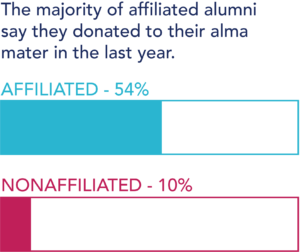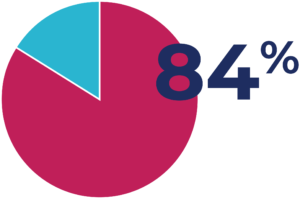The results of the 2021 Gallup survey conducted on behalf of the National Panhellenic Conference (NPC) and the North American Interfraternity Conference (NIC) and partially funded by the Foundation for Fraternal Excellence (FFE) highlights strong relationships between fraternity and sorority membership and the reported strength of the college experience, feelings of preparation for life after college and general wellbeing. The survey of more than 10,000 college alumni compared the experiences of fraternity and sorority alumni members (“affiliated alumni”) with those who were not fraternity and sorority members (“nonaffiliated alumni”).
 Affiliated alumni were more likely to report feeling supported by faculty and mentors and were three times as likely to have engaged in experiential learning. Fraternity and sorority alumni are also substantially more likely than nonaffiliated alumni to recommend their college or university to others, agree that their education was worth the cost and are more likely to donate to their institution.
Affiliated alumni were more likely to report feeling supported by faculty and mentors and were three times as likely to have engaged in experiential learning. Fraternity and sorority alumni are also substantially more likely than nonaffiliated alumni to recommend their college or university to others, agree that their education was worth the cost and are more likely to donate to their institution.
“As fraternities and sororities evolve in how they serve current and future students, these data are incredibly important for policymakers, university leaders and Greek organizations. These findings continue to reinforce how vital students’ experiences in college are to their lives after they graduate,” said Stephanie Marken, executive director for education research at Gallup.
Differences in experiences between affiliated and nonaffiliated alumni are also apparent on career-related factors, with affiliated alumni reporting a higher likelihood of finding a good job quickly after graduation. More than half of fraternity and sorority alumni, compared to just 36% of nonaffiliated alumni, had accepted a job offer or found employment within two months of graduation.
“This research reaffirms what many of us have long known to be true about the fraternal experience. Our members are prepared, they’re more likely to thrive across their personal and professional lives and they’re more likely to be engaged with their alma maters and in their communities,” said Dani Weatherford, CEO of the National Panhellenic Conference.
“Leaders from across NPC continue to seek ways to further strengthen the sorority experience and make it more accessible and inclusive, but these results demonstrate the core of the experience is delivering on the central mission each of our organizations share – building community in ways that help our members succeed.”
“This research aligns with previous findings from Gallup and other researchers that prove fraternities foster positive mental health, serve as a success accelerator for students and engender tremendous loyalty with alumni to support their alma mater,” said Judson Horras, president and CEO of the North American Interfraternity Conference.
Other key findings include:
-

Eighty-four percent of affiliated members say if they had to do it all over again, they would still
join their fraternity or sorority.Eighty-four percent of affiliated alumni say if they had to do it all over again, they would still join their fraternity or sorority.
- More than one in five affiliated alumni (23%), versus 14% of nonaffiliated alumni, report having a professor who cared about them as a person and made them excited about learning, and had a mentor who encouraged them to pursue their goals and dreams.
- Nearly one in four affiliated alumni (24%), as opposed to just 8% of nonaffiliated alumni, strongly agreed that they had a job or internship that allowed them to apply classroom learnings, worked on a project that took more than a semester to complete and were “extremely active” in extracurricular activities or organizations.
- A majority of affiliated alumni are “promoters” of their institution, based on their likelihood to recommend it. Nearly two-thirds (65%) of affiliated alumni selected a 9 or 10 on a scale where 10 is the highest likelihood to recommend their alma mater, compared with 43% of nonaffiliated alumni.
- The majority (54%) of affiliated alumni say they donated to their alma mater in the last year, versus just 10% of nonaffiliated alumni.
- Majorities of affiliated alumni are thriving in every area of their wellbeing:
- 62% in career wellbeing (compared to 34% nonaffiliated)
- 66% in community wellbeing (compared to 36% nonaffiliated)
- 51% in financial wellbeing (compared to 32% nonaffiliated)
- 53% in physical wellbeing (compared to 24% nonaffiliated)
- 62% in social wellbeing (compared to 40% nonaffiliated).
Dive Deeper
- View the complete report “Fraternities & Sororities: Experiences and Outcomes in College, Work and Life”
- Watch the 2021 Seminar session with Stephanie Marken, executive director for education research at Gallup via the FFE Knowledge Center (these resources are password protected, please email us for the password)
- See how FFE members are using the findings within their organizations
Methodology
As part of its national survey of more than 10,000 U.S. college graduates conducted between Jan. 15 and Jan. 29, 2021, Gallup interviewed more than 3,000 alumni of diverse backgrounds and socioeconomic statuses who graduated within the past 15 years and are members of fraternities or sororities. These alumni, referred to throughout the report as “affiliated alumni,” represent a broad range of demographics and member organizations and councils, including NPC, NIC, National Pan-Hellenic Council, Inc. (NPHC), National Multicultural Greek Council (NMGC), National ADIPA Panhellenic Council (NAPA) and National Association of Latino Fraternal Organizations (NALFO). All other graduates are referred to as “nonaffiliated alumni.”
Gallup delivers analytics and advice to help leaders and organizations solve their most pressing problems. Combining more than 80 years of experience with its global reach, Gallup knows more about the attitudes and behaviors of employees, customers, students and citizens than any other organization in the world.
The National Panhellenic Conference (NPC), one of the largest organizations advocating for women, is the umbrella group for 26 national and international social sororities. Through its advocacy, NPC highlights the importance of women’s-only spaces and showcases the transformational power of the sorority experience.
The North American Interfraternity Conference (NIC) is a trade association that represents 57 national and international men’s fraternities, including a diverse range of culturally and religious-based organizations, on campuses in the United States and Canada. The NIC is committed to supporting opportunities for young men to seek and form positive, enriching fraternal bonds. The health and safety of students guides our advocacy, standards and education.
The Foundation for Fraternal Excellence (FFE) cultivates a culture of philanthropy and care across the fraternal community. Often known as the “heart” of a fraternal organization, foundations and fundraising professionals come together to comprise the FFE membership and benefit from programs, services and resources for fraternal fundraising. The FFE also offers scholarships to graduate students and professionals for continuing education, provides operational support for new and emerging fraternal foundations, and works hand-in-hand with fraternal communities and the North American Interfraternity Conference (NIC) to strengthen and improve the entire fraternity/sorority experience.
Thank you to the FFE donors who have given to the Industry Restricted Research Fund. These gifts make work like the Gallup project possible.


